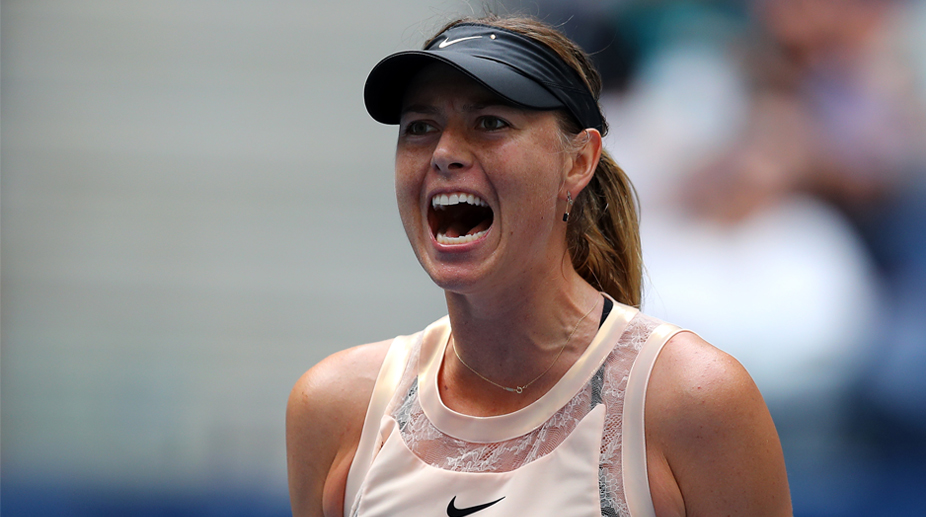‘Are you serious? You and me? Going to dinner?’: Maria Sharapova recalls first meet with Novak Djokovic
Novak Djokovic, too, confirmed that Sharapova's recollection that both had gone to dinner during their initial days of the career was true.
Sharapova has already left Flushing Meadows, but her tale of comeback and controversy will never leave the game.

Russian tennis star Maria Sharapova (Photo: AFP)
Russian tennis star Maria Sharapova’s Grand Slam return after a 15-month doping ban ended in defeat on Sunday. But if the former World No.1 had the chance to eventually win the US Open at the weekend, would she be booed when she received the trophy?
Sharapova hadn’t played in a major tournament since the Australian Open in January 2016, when she tested positive for the newly banned drug meldonium. She served a 15-month ban for that, returning to the tour this April with a ranking too low to get into Grand Slam events, reports Xinhua news agency.
Advertisement
The French Open denied her a wild card invitation, then she planned to try to qualify for Wimbledon before pulling out because of a left leg injury.
Advertisement
But she was able to enter the US Open thanks to a wild card from the US Tennis Association (USTA), which put its 2006 champion in the Arthur Ashe Stadium every time she played over the past week.
People need to know that a culture of clean sport must be built by uniting athletes, brands, events, clubs, and others in a promise to always train clean, compete clean, and live clean.
So give French Tennis Federation President Bernard Giudicelli credit for daring to say no to Sharapova ahead of this year’s French Open. He knows he has to take a stronger stance toward doping fight.
“I’m very sorry for Maria, very sorry for her fans. They might be disappointed; she might be very disappointed,” Giudicelli said. “But it’s my responsibility and my mission to protect the game.”
“While there can be a wild card for return from injury, there can’t be a wild card for return from doping,” he added.
Imagine that. Someone taking a stand against doping really means something.
The USTA defended that they treated Sharapova like several past US Open champions.
“Her suspension under the terms of the tennis anti-doping programme was completed and therefore was not one of the factors weighed in our wild card selection process,” the USTA said in a statement.
With Serena Williams on the sidelines, the women’s draw could certainly have used a boost from Sharapova’s star power. The USTA does know that.
With help of the wild card, Sharapova’s trademark grunt was back at the US Open, as was her signature style — for her first round match, she appeared in a black outfit by Italian fashion designer Riccardo Tisci and Nike.
Sharapova, the five-time Grand Slam champion, former World No.1 and now a controversial player in her sport, had won three matches to storm to fourth round where she lost to Anastasija Sevastova of Latvia.
Her return obviously divided opinions and her wild card sparked criticism.
“When someone has been banned or out of competition, I think you have to work for it a little bit to go and play your tournaments and not help that much sometimes,” Wimbledon champion and Spanish third seed Garbine Muguruza said. “You’ve got to work hard and deserve it again.”
American CoCo Vandeweghe knows from previously receiving a wild card into the tournament that it can be a huge benefit to a young player or one returning from injury. She wishes Sharapova’s wild card went to someone else. Some else from the US. “Anyway, it’s a US event,” she said.
Another former World No.1 Caroline Wozniacki slammed as “unacceptable and questionable” the US Open decision to give Sharapova back-to-back matches on the showpiece Arthur Ashe Stadium.
However, a lot of fans already sympathise with her contention that she is not an intentional doper. So during Sharapova’s every match on Arthur Ashe Stadium, the crowd were in raptures. Even though the US Open was the most significant event Sharapova has played since her doping ban, people heard no echo of the boos that had greeted Justin Gatlin at London’s Olympic Park.
Americans have shown a willingness to forgive athletes who’ve taken performance-enhancing drugs. The fans in Arthur Ashe stadium were no different.
The doping fight has been going on for nearly a half century now. It’s hard to believe that, almost 30 years after Ben Johnson was caught in Seoul Olympic Games after running the 100 metres faster than anyone ever, doping police still need to fight hard.
What’s occurred in sports tells the world that the problem has not been solved, it’s still alive. The fight against doping will never be won, and it needs to be continued.
Sharapova has already left Flushing Meadows, but her tale of comeback and controversy will never leave the game.
Advertisement